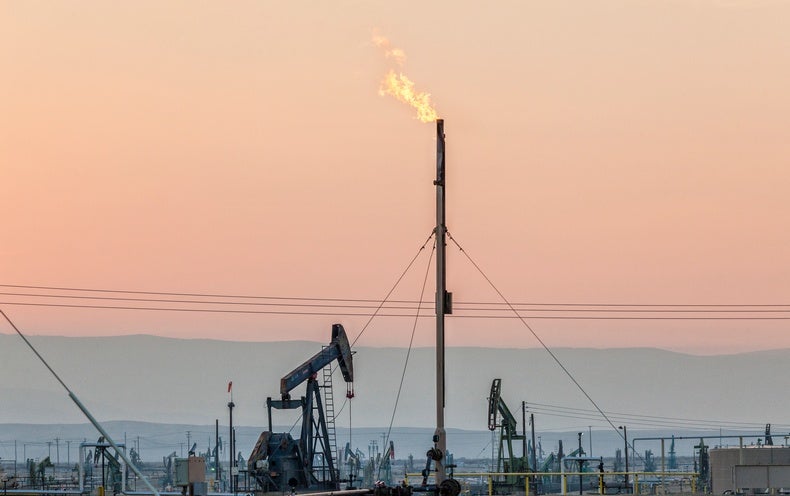
A coalition of oil and gas companies announced a new emissions target yesterday to reduce the “carbon intensity” of their operations over the next five years, but critics said the plan didn’t go far enough.
The Oil and Gas Climate Initiative (OGCI), a coalition aiming to “accelerate the transition to a low-carbon future,” said its member companies pledged to lower the intensity—or emissions per unit of output—of their aggregated upstream oil and gas operations by as much as 13% from 2017 levels. That means they would reduce carbon intensity of their operations to 20 to 21 kilograms of carbon dioxide equivalent per barrel of crude oil by 2025—down from a baseline of 23 kilograms.
The target covers methane and carbon dioxide emitted per unit of oil and gas, according to the group, which includes U.S. majors such as Exxon Mobil Corp. as well as European companies like BP PLC.
“An intensity target allows for the shifts that will occur across the portfolios of our member companies, as well as allow new members to join the target if required and others to adopt this metric as a benchmark,” OGCI said in a statement.
Yet some observers said going after carbon intensity reductions is “low-hanging fruit” and an action that should have been taken by companies decades ago.
“They need to be phasing out the oil and gas ... and instead they are kind of making their fossil fuel production ever so slightly cleaner,” said Lorne Stockman, a senior research analyst at Oil Change International.
Making per-barrel emissions cleaner won’t make a real difference if production continues to increase, he added. “We don’t just need to be a little bit cleaner a decade from now; we need to be ... cutting emissions 7, 8% per year to get to a 1.5 [degrees Celsius] target,” Stockman said.
OGCI’s target does not include so-called Scope 3 emissions, a spokesman for the group said. Scope 3 emissions include those that aren’t produced at a company’s facilities and that customers produce when they burn fossil fuels (Energywire, May 13). They can make up 85% to 90% of a company’s total emissions, according to analysts.
Andrew Grant, head of oil, gas and mining at London-based think tank the Carbon Tracker Initiative, said a target based on intensity “allows increases in emissions overall” and that the group average could let “poor performers off the hook.”
“Having some targets to reduce carbon pollution is better than none,” Grant said in a statement. “But the industry can never consider itself ‘aligned’ with the Paris goals when business plans assume steady investment in fossil fuel production on a planet with absolute limits."
Jennifer Layke, global head of the energy program at the World Resources Institute, went further and called the target “weak” because it only covers upstream emissions.
But OGCI said the new target is “consistent” with reductions needed across the industry in order to support Paris Agreement goals.
Jerome Schmitt, chairman of the OGCI Executive Committee, said on a YouTube video that the target is a “practical one” because it’s near term.
“It is pushing us to improve and reduce the collective emissions of the OGCI member companies by minus 9 to 13% to support the Paris Agreement aims,” Schmitt said, adding, “This target is covering about 30% of the oil and gas industries, with companies coming from everywhere in the world.”
The target would cut the equivalent carbon emissions produced by energy use in up to 6 million homes, according to the group.
Daniel Raimi, a senior research associate at Resources for the Future, said that over the short term, OGCI’s assumption that oil and gas will continue to be used “at scale” in the global energy system is reasonable, even with ambitious climate scenarios over the next five years.
“Once we get into the longer term, the dynamics start to look very different,” Raimi said. “You would need to do quite a bit more than reduce your carbon intensity to achieve the Paris goals over the next 20 years.”
Raimi said that although reducing Scope 1 and Scope 2 emissions is helpful, it’s “insufficient” to achieve long-term climate goals. The most effective and comprehensive way to hit those goals is going to come through government policy, he said, rather than private-sector action.
Reprinted from Climatewire with permission from E&E News. E&E provides daily coverage of essential energy and environmental news at www.eenews.net.
"Oil" - Google News
July 18, 2020 at 12:30AM
https://ift.tt/2Bddl4O
Oil and Gas Companies Announce a New CO 2 Emissions Target - Scientific American
"Oil" - Google News
https://ift.tt/2SukWkJ
https://ift.tt/3fcD5NP
Bagikan Berita Ini















0 Response to "Oil and Gas Companies Announce a New CO 2 Emissions Target - Scientific American"
Post a Comment